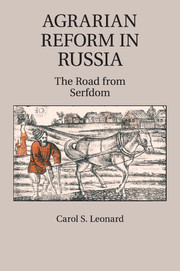Book contents
- Frontmatter
- Contents
- Tables and Figures
- Preface
- Agrarian Reform in Russia
- Introduction
- PART I DILEMMAS OF AGRARIAN REFORM IN RUSSIA
- PART II RUSSIAN LAW AND RURAL ORGANIZATION, 1861–2010
- PART III RUSSIAN AGRICULTURAL PERFORMANCE, 1861–2010
- 6 Technology and Farming Culture
- 7 Reform and Long-Run Productivity Growth, 1861–2010
- Conclusion: The Present from the Perspective of the Past
- APPENDICES
- References
- Index
Conclusion: The Present from the Perspective of the Past
Published online by Cambridge University Press: 01 June 2011
- Frontmatter
- Contents
- Tables and Figures
- Preface
- Agrarian Reform in Russia
- Introduction
- PART I DILEMMAS OF AGRARIAN REFORM IN RUSSIA
- PART II RUSSIAN LAW AND RURAL ORGANIZATION, 1861–2010
- PART III RUSSIAN AGRICULTURAL PERFORMANCE, 1861–2010
- 6 Technology and Farming Culture
- 7 Reform and Long-Run Productivity Growth, 1861–2010
- Conclusion: The Present from the Perspective of the Past
- APPENDICES
- References
- Index
Summary
There are many ways of looking at the history of Russia's agrarian reforms. One may see them in light of industrial policy: evidence of the government's determination to break with rural backwardness, or one may trace the process of decision-making for a study of governance. One may see them in light of their effect on agricultural performance or the evolution of agrarian institutions. But one can hardly fail to identify in each way of looking the close cooperation even in eras of reform between the state and rural elites. Ordinarily, the influence of vested interests was sufficient to block legal change to their exclusive prerogatives in the rural economy. Even in conditions of crisis, elite interests were conciliated by compromise. Cooperation on one reform was coordinated with concessions on another, and those who opposed reforms were assured of retained power in government. The crisis- reform pattern in agriculture survived for a century and a half because it was collectively stable and deliberately constructed to stimulate the economy without causing extensive social disruption.
BREAKING WITH BACKWARDNESS
Generally concerned more about stability and order, the Russian government was nevertheless particularly concerned about the consequences of rural backwardness in times of crisis. Rosenberg (1993, p. 841) explains perceptions about the necessity of agrarian reform in the late nineteenth century:
…a major reason the countryside had to change if Russia was to move forward had to do with the simple ignorance of peasant lives, which populists romanticized and Marxists scorned, and was thought by almost everyone to be a barrier against what was variously understood as Russia's place in the Western community.
- Type
- Chapter
- Information
- Agrarian Reform in RussiaThe Road from Serfdom, pp. 256 - 272Publisher: Cambridge University PressPrint publication year: 2010



